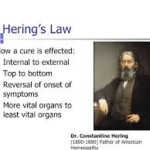Mercurius Solubilis (merc.)
Study of Mercurius is a prime example of how the concept of the essence of a remedy can clear up a seemingly overwhelming mass of data. Mercurius being one of the more extensively proven and widely used remedies in the Materia Medica, presents a formidable array of symptoms for the beginner to study; it is a veritable textbook of pathological states. However, after repeated and prolonged study and meditation on the Materia Medica, one gradually is able to discern a thread, a theme, which runs through the remedy. Once this is comprehended, all the “data” falls in place into a single unique image.
In Mercurius, there is no single word or phrase which adequately described this thread. The basic idea is that there is a lack of reactive power coupled with an instability or inefficiency of function. The healthy organism has a defence mechanism, a reactivity, which enables it to create a stable, efficient equilibrium upon exposure to the many physical and emotional stimuli in the environment. In Mercurius, this reactive power is weakened, becoming unstable and wavering in its functions. Virtually all stimuli are absorbed by the patient without adequate defence, resulting in a pathological condition.
The lack of defensive power results in the Mercurius patient being sensitive to everything. As we go through the Materia Medica we find that the Mercurius patient is AGGRAVATED by everything – heat, cold, outdoors, wet weather, change of weather, warmth of bed, perspiration, exertions, various foods etc. By contrast, there seem to be very few ameliorations; very little can be absorbed by the patient to result in comfort, because the system is unable to properly adjust to anything. As an interesting demonstration (though not a generally recommended method for study) one can go through the Generalities section of the Repertory seeking the number of rubrics in which it is listed in italics or bold type as being aggravated or ameliorated by physical influences; there are only 7 listings for amelioration (5 of which have to do with lying down), while there are 55 rubrics describing aggravations. Because of this extreme vulnerability, we see that the Mercurius patient has a narrow range of tolerance to everything; for example, such a patient will be comfortable between only a very narrow range of temperatures, becoming uncomfortable from eve slight heart or cold.
The intolerance to heat and cold illustrates the instability which characterizes the particular Mercurius weakness. As mentioned by Kent, the patient is a living “thermometer”. At one moment, he is suffering from cold and seeks warmth, but once warm he becomes aggravated by the warmth also. This is true not only during a fever, but also chronically. There is also a weakness and instability in emotional expression; weeping alternating with laughing. Unlike Ignatia, in which this symptom is a manifestation of a hysterical state from uncontrolled emotion, the Mercurius weeping/laughing is more of a mechanical instability. Once weeping, Mercurius feels a kind of mood come upon her which results in a swing to the opposite extreme of laughing; mechanically, laughing and weeping can often be quite similar, and so the Mercurius instability causes the patient to waver from one state to the other quite readily. The Mercurius instability, its inefficiency in function, can be illustrated nicely by reflecting on the physical state of Mercury. If you break a Mercury thermometer, you discover that Mercury seems to exist in a state somewhere between a liquid and a solid. If flows like a liquid, yet it tends to retain its own shape to some extent like a solid. If you try to pick it up with your fingers, it seems to elude you; it does not allow itself to be grasped like a solid, and it does not stick to your skin like a liquid. In its physical form, Mercurius is erratic in function, just as it is unstable and inefficient in its pathological state.
Thus we can see readily that the Mercurius weakness is not like that of other remedies. Arsenicum can exhibit a prostrating kind of weakness, but it is quite unlike the instability of Mercurius. Arsenicum, of course, shares many similar specific pathological symptoms, but the Arsenicum patient’s cold intolerance is relieved by warmth; it is also true, of course, that mentally Arsenicum shows much more reactive power – anxiety, restless activity of mind, a shrewdness. Stannum, Helonias, and Baptisia are other remedies with severe weakness of reactive power, but not with the instability and inefficiency of Mercurius. This Mercurius weakness of reaction s not a sudden event. It is a slow, insidious process which can be difficult for the patient, and therefore for the homoeopath, to perceive in the early stages. It creeps up in such a slow way that the patient barely notices the vulnerability to stimuli. By the time the patient consults a homoeopath for a particular complaint the vast bulk of the symptoms have been forgotten, no longer being recognized as abnormal. Having learned to adapt to the narrow range of tolerance to things, the patient reports only the immediate symptoms which bring him to the consultation. In early stages, it takes patient, skilful and thoughtful questioning to elicit homoeopathic symptoms which the patient himself may not be aware are different from the experience of other people. Because the mental state is the centre of being of the person, let us describe in detail the stages of development of pathology on the mental plane. The first effect noticed is the slowness of action of the Mercurius mind. The patient is slow to answer questions (like Phosphorus and Phosphoric acid, as well as other remedies). He is slow to comprehend what is happening, or what is being asked of him. This is at first not a confusion of mind, or poor memory, but an actual slowness, and incomprehension, a kind of stupidity. Cal. carb., of course, also has a slowness of mind, but Calcarea is an intelligent person; once comprehended, Calcarea is able to use the idea efficiently. Mercurius is both sow of mind and poor in comprehension. The Mercurius mentality has a kind of inefficiency in action. Mercurius is one of the remedies characterized by hurriedness and restless, but it is a hurry in which the person does not accomplish anything. A task which should take half an hour to accomplish will take the Mercurius patient one and a half hours. Remedies such as Tarentula, Sulphuric acid, Nux vomica, and Natrum mur. are also in a hurry to a pathological degree, but their activities are nevertheless productive and efficient. The second stage is characterized by impulsivity. The Mercurius mind, because of the vulnerability to stimuli from without and from within, is unable to keep his mind concentrated purely in a particular direction. The healthy person s able to focus the mind on a subject or task despite the many random thoughts and ideas which may attempt to intrude. The Mercurius mind does not have the strength for such concentration. Every random thought which pops into the mind becomes something to which the patient feels a need to respond. This is related to the inefficiency of mind, but becomes even more extreme as the pathology progresses. Eventually the Mercurius patient becomes susceptible to every conceivable kind of impulse. He may have an impulse to strike, to smash things, to kill someone over a merely slight offence, or even to kill a loved one. (Mercurius, Nux vomica and Platina are the only remedies listed for this impulse).
These impulses, however, are not readily evident to the questioner. The Mercurius patient feels the urges, but controls them. He is a closed individual, slow to answer, reluctant to reveal to others what he is feeling. He has enough insight to recognize his vulnerability to stimuli and impulses. Recognizing that this susceptibility can produce trouble for him, he simply holds them inside, not allowing them to be socially visible. This is a fragile strategy; the person is still just as vulnerable and must expend considerable energy keeping himself under control.
As the pathology progresses into the third stage, the inefficiency of mind, the poor comprehension, the impulsivity and vulnerability finally result in a paranoid state. The patient feels so vulnerable that he begins to perceive everyone as his enemy. The fragile control mechanism has not succeeded so that inevitably he perceives everyone as an adversary, someone he must defend against. By this point, the patient is not actually insane, but he may feel he is going insane, and he may have a fear of insanity, particularly at night.
In the final stage of mental pathology, we do not see the development of overt insanity as we see in many remedies. In Mercurius, the lack of reactive power is so extreme that it cannot even generate an insane state. Instead there develops imbecility. It is as if the brain has become softened and incapable of reacting at all. All stimuli are absorbed, but no longer comprehended.
The sequence of events in the development of illness in Mercurius on the physical and mental levels both is one of the classic examples of progression of pathology so well understood by the science of homoeopathy. Although Mercurius can affect every organ system, we see most commonly that its “target organs” seem to be first the skin and mucous membranes, next the spinal column, and finally the brain. The slow, insidious progression of illness through these organs calls to mind the possibility that Mercurius has a particular affinity for ectodermally derived structures. As is well known to biology, the embryo is differentiated into three derivative tissues; ectoderm, mesoderm, and endoderm. Each of these tissues results in separate functions in the nature organism; The ectodermal structures include in particular the skin, the mucous membranes near the surface of the body, the eyes, and the nervous system. These are structures for which Mercurius has an affinity.
The weakness in defensive reaction is evident throughout all the physical symptomatology of Mercurius. As mentioned before, Mercurius patients have one of the most narrow ranges of tolerance to heat and cold of all remedies. Because of weakness of the defence mechanism, there is great instability to the Mercurius system. This is evident in a variety of physical symptoms for which Mercurius is well known. Mercurius is known for easy perspiration, and then not being relieved by it. Perspiration is a normal function designed to cool the body when it is being overheated, and also to excrete toxic products. In Mercurius, however, the slightest stimulus or exertion produces perspiration because of his oversensitivity. It is an over-reaction to a minimal stimulus. Then even the perspiration itself becomes a source of aggravation to the person with such a narrow range of tolerance.
The lack of reactive power is the underlying cause for the characteristic mercurius aggravation from suppression of discharges, such as from otorrhoea or other suppurative disorders. In Mercurius, such suppression occurs very easily by orthodox treatment. Unlike the healthy defence which eventually has the power to re-establish the discharge in the same or another form, the Mercurius system merely absorbs the morbific influence, allowing it to create pathology at a deeper level.
There is a tendency to chronic suppurations of all kinds, suppurations which can last for many years. There is simply not enough defensive force to eliminate the infection, so a “stalemate” results, until the allopath interferes and suppresses the infection to a deeper level.
There is much ulceration, particularly of the skin and mucous membranes (aphthae) in Mercurius. These are phagadenic ulcerations, ulcers which the body does not have the power to heal and therefore allows them to spread insidiously over ever widening areas.
When a suppuration or ulceration is established in Mercurius, there is not enough power to heal them, so a progressive decomposition results. This is most evident in degeneration of the gums. The gums break down, causing a loosening of teeth, a formation of pockets of pus, and a very offensive odour. The offensive odours characteristic of Mercurius result from the decomposition which is inevitable in a system lacking the power to react.
Just as we see that perspiration occurs from oversensitivity of the system to any burden place upon it, we also can see similar process resulting in the Mercurius excessive salivation. The stomach is disrupted by almost any influence, and then even the slightest disturbance in the stomach results in excessive salivation. The salivation can be seen at any time of day or night, but it is most marked during the night, a typical time of aggravation for Mercurius. Having such low reactivity, the patient is steadily weakened by all the influences during the day, until finally the weakness becomes most evident at night; bone pains, the inflammatory symptoms, the nervous system complaints, the fear of insanity, and the salivation are all worse at night.
As an intermediate stage in its progression from the surface of the body to the brain, the Mercurius pathology strikes the spine and peripheral nervous system, producing a tremor, seen particularly as being caused by Parkinson’s disease or arteriosclerosis, but its more fundamental cause in a Mercurius case is the defensive weakness and consequent instability of function. The patient finds that he is unable to hold a glass of water in his hands without spilling it, unless he braces his elbow or forearm. This tremor is distinctively symbolic of the Mercurius essence. The lack of reactivity – the weakness in the face of all stimuli which are absorbed so easily into the system – results finally in an instability in normal functions. Just as the temperature control mechanism wavers back and forth between slight extremes of heat and cold, constantly trying inefficiently to compensate, so also the hand waves back and forth in an inefficient attempt to perform its normal function – hence the tremor. Once this essence of the Mercurius image is comprehended, one can re-read the Materia Medicas and discover that the morass of date now fits into a single coherent picture.



























 Hussain Kaisrani, The chief consultant and director at Homeopathic Consultancy, Lahore is highly educated, writer and a blogger
Hussain Kaisrani, The chief consultant and director at Homeopathic Consultancy, Lahore is highly educated, writer and a blogger 